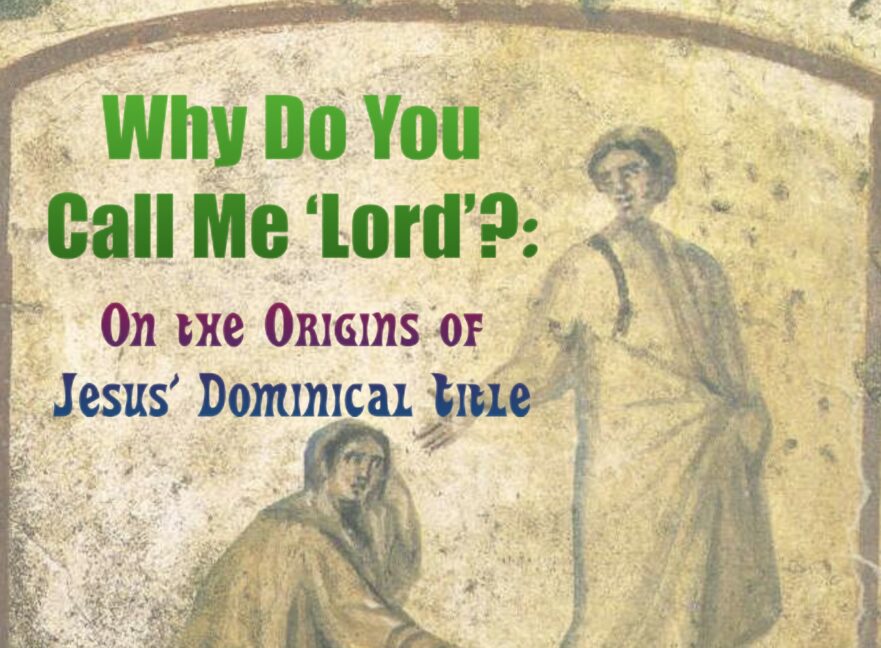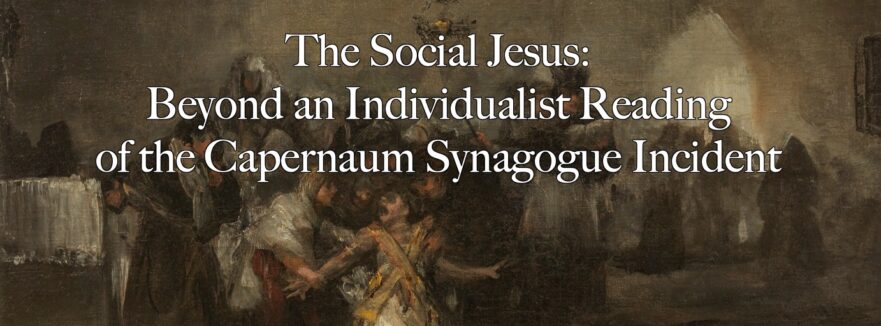The view that Jesus could not be affected by impurity and that Jesus was able to spread his purity to others is based on faulty assumptions and invalid inferences.
(Why) Did Jews Hate Tax Collectors–Or Did They? The Evolution of a Modern Stereotype in Biblical Studies

The popular image of tax collectors ostracized from Jewish society demands a second look.
Why Do You Call Me ‘Lord’?: On the Origins of Jesus’ Dominical Title

The confession “Jesus is Lord” is the simplest and earliest Christian creed. But how did referring to Jesus as “Lord” begin?
The Social Jesus: Beyond an Individualist Reading of the Capernaum Synagogue Incident

In the social reading of the Capernaum Synagogue incident Jesus restores the tattered fabric of the community, exchanging the way things were for a newer and better way.
Teaching in Kefar Nahum

A clash between entrenched demonic powers and one proclaiming the Kingdom of Heaven.
Tangled up in Techēlet: Tzitzit (Ritual Tassels) in the Time of Jesus

Although the wearing of tzitzit is enjoined in Scripture, we do not find records of its actual observance until the Second Temple period.
Character Profile: Mary Magdalene

In place of accurate facts about Mary Magdalene, strange ideas and fabulous speculations have arisen that have diminished the true image of one of the most important women in the New Testament.
Did Jesus Save the Life of an Adulteress?

A fresh look at the text and at the historical evidence yields a version of the story of the Woman Caught in Adultery that turns out to be surprisingly different from the way it is usually portrayed.
Mustard Seed and Starter Dough Parables

Jesus used the Mustard Seed and Starter Dough parables to demonstrate that the Kingdom of Heaven is a living and active presence that is increasing within the realm of human experience.
Did Jesus Call God “Abba”?

In the past, some scholars have relied on the evidence of Jesus’ use of the word “Abba” to draw far-reaching conclusions about Jesus, the language he spoke, and his relationship to Judaism. As part of their ongoing research for the LOY project, David Bivin and Joshua Tilton revisited the evidence for Jesus’ use of “Abba” as an address to God. Tilton summarizes their findings here.
Sending the Twelve: Conduct in Town

David N. Bivin and Joshua N. Tilton suggest a Hebrew reconstruction of Jesus’ instructions about how the twelve apostles were to behave when they entered a town. In this pericope we learn about the giving and receiving of hospitality among Jesus’ earliest followers. We also learn what may be wrong about the popular view that shaking the dust from the apostles’ feet was a symbolic action meant to signal to Jews who rejected Jesus that they were henceforth to be considered as Gentiles.
“Shake the Dust from Your Feet”: What Did the Apostles’ Action Signify?

The standard interpretation of the apostles’ dust-shaking action proposes that Jesus turned the concept of the impurity of Gentile lands against the Jewish inhabitants of cities within the (ritually pure) land of Israel. This interpretation concludes that shaking the dust from their feet dramatically symbolized that Jesus’ apostles would henceforth regard the Jewish inhabitants of a city that had rejected their message as though they were cut off from Israel. It is time for this mistaken interpretation to finally be put to rest.
Sending the Twelve: “The Harvest Is Plentiful” and “A Flock Among Wolves”

Yeshua told his twelve emissaries: “There’s a huge harvest, but a shortage of harvesters. So send word to the owner of the field to hire more workers to help them finish the job.
“Go! But beware, I’m sending you out like a defenseless flock into a pack of ravenous wolves.”
Unintentional Anti-Semitism in the Church

I heard an all too familiar theme surface in an otherwise good sermon with regard to the recognition and acceptance of Jesus as Messiah: “The Jews just missed it!” Sadly, this affront by categorization also shows a total lack of recognition of the role of Jews in the early church and in their making the message of salvation through Yeshua (Jesus) available to non-Jews. It is as if Yeshua appears on the scene, is rejected by the Jews, but is welcomed with open arms by the non-Jews.
Are There Absolutes for the Christian?

With the emphasis on relativism and situational ethics in popular culture, one might wonder if there truly are any absolutes to guide us as Christians. Perhaps we can excuse any or all behavior or lifestyle on the basis of “that’s just the way God made me—besides, Jesus paid the price for my sin so everything’s cool!”
I happily stand corrected!
After reading my “Jehovah, A Christian Misunderstanding” article, a Jerusalem Perspective Member provided several impressive references, pointed out that the Christian reading “Jehovah” can be traced to Raymond Martin’s Pugeo Fidei (1270 A.D.), and may have originated much earlier, even as early as the ninth century!
The Numbers Game: Bible Codes (Numerology and Gematria)

Biblical writers infrequently consciously used numerical patterns or codes in their compositions.


